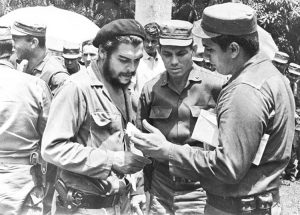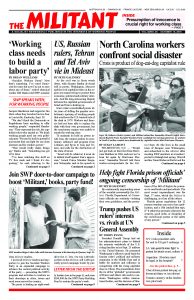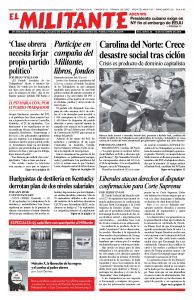Episodes of the Cuban Revolutionary War, 1956-58 by Ernesto Che Guevara is one of Pathfinder’s Books of the Month for October. Guevara, at Fidel Castro’s side, became one of the central leaders of the world-changing 1959 Cuban Revolution. He describes how Cuba’s workers and farmers made their revolution, highlighting the political advances and military battles that he participated in with the Rebel Army. Oct. 8 marks the 51st anniversary of his capture and murder by a CIA-organized operation in Bolivia, where he was helping lead a guerrilla movement against that country’s military dictatorship. Below is an excerpt from the book’s introduction by Socialist Workers Party leader Mary-Alice Waters, who edited the book. Copyright © 1996 by Pathfinder Press. Reprinted by permission.
BY MARY-ALICE WATERS
Without pretension or exaggeration Ernesto Che Guevara provides a firsthand account in these pages of the final two years of the revolutionary struggle in Cuba that culminated January 1, 1959, in the destruction of the brutal U.S.-backed dictatorship of Fulgencio Batista.

The workers and farmers government consolidated in the following months rapidly became what Guevara calls “the hope of the unredeemed Americas.” It opened the door to the first socialist revolution in the hemisphere, a reality that almost four decades later still stands at the center of world politics.
Episodes of the Cuban Revolutionary War, written with clarity and humor, is also about the education of Ernesto Che Guevara, the young Argentine rebel who became one of the central leaders of the Cuban revolution. It is a book that reveals Che’s political coming of age — often to his own surprise — as he is transformed from a serious student of Marxism with little practical political experience into a seasoned combat leader of men and women. We watch him as he takes on greater and greater responsibilities. We follow his growth, his education, and his transformation by the Cuban workers and peasants alongside of whom he is engaged in a life-and-death struggle. From a determined revolutionary intellectual imbued with a spirit of adventure, a self-described Quixote, one of the great communist leaders of the twentieth century begins to emerge.
“Some time ago,” Guevara wrote to his parents from Mexico in July 1956, “I met a young Cuban leader who invited me to join his movement, dedicated to the armed liberation of his country. I of course accepted.” Guevara’s letter, which appears here in full for the first time in English, continued, “My future is linked to the liberation of Cuba. Either I will triumph with it, or I will die there.”…
The Rebel Army was a political vanguard organization, built around an expanding cadre that was painstakingly selected and tested in battle. As the revolutionary war advanced, these cadres became more educated and more politically homogeneous in the process.
Out of the eighty-two combatants who participated in the Granma expedition, Fidel Castro told Italian journalist Gianni Minà in 1987, “there were many young men who, had they survived the initial expedition, were well suited to become leaders. At least fifteen or twenty outstanding leaders could have emerged from our group — because a man needs both the opportunity and responsibilities to distinguish himself.” The accuracy of this judgment, Fidel noted, was confirmed by the fact that “out of those few who survived, several brilliant leaders emerged,” men such as Che, Raúl Castro, and Camilo Cienfuegos.
Fidel, like Che, first “looked for men and women who are made of good timber,” is the way a former Rebel Army combatant, today a brigadier general in Cuba’s Revolutionary Armed Forces, explained it. If the human material is there, “it can be shaped. Leaders who are forged in adverse conditions develop a deep sense of fraternity, of comradeship, knowing that human beings need each other, cannot live as hermits like Robinson Crusoe. In order to withstand the hostile environment of the Sierra, to really be able to fight, one has to be part of a collective effort. In such a context human qualities are born, allowing future leaders to be forged.”
Throughout the pages of the Episodes, we are introduced to hundreds of the men and women whose courage and capacities made possible the Cuban revolution; and we see in turn, how they grew into the fighters and leaders they became.
“Men may contribute to the making of history,” Castro tells the people of San Miguel in Santiago de Chile in the speech about Che at the opening of this volume, “but history also makes men.”…
Episodes of the Cuban Revolutionary War deals with the greatest challenge facing humanity at the dawn of the twenty-first century: it chronicles the forging of a revolutionary cadre able — and willing — to lead a mass armed insurrection to power and establish a popular revolutionary government.
The war whose episodes are the subject of this book was not the end but the beginning of the greatest historic event of the second half of the twentieth century, the opening of the socialist revolution in the Americas. The story of that revolution is still being written by the creativity of millions of women and men determined to remake the world and transform themselves in the process. Almost forty years after they confidently set out on that road, the words of Che Guevara at the end of this book remain true. We Cubans have begun the struggle for our territory’s total freedom, he wrote:
We know it will not be easy, but we are all aware of the enormous historic responsibility of the July 26 Movement, of the Cuban revolution, of the nation in general, to be an example for all peoples of Latin America, whom we must not disappoint. Our friends of the indomitable continent can be sure that, if need be, we will struggle no matter what the economic consequence of our acts may be. And if the fight is taken further still, we shall struggle to the last drop of our rebel blood.
This book is dedicated to a new generation of fighters around the world for whom the example of the Cuban revolution and the line of march of its victorious Rebel Army still show the way.

